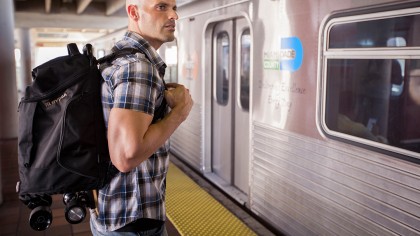Iris scanning could be the train ticket of the future
Ticketless transport

The UK’s Rail Delivery Group has suggested that new technologies such as biometric scanning and digital signalling could “have a vital role to play” in reducing costs and dramatically improving the efficiency of rail travel in the future.
According to the BBC, customers could provide iris or fingerprint scans while purchasing their tickets which would enable ticket-free transport.
The train service itself could be improved by the use of digital signalling which would enable trains to travel more closely together and therefore more frequently.
Improvements such as these won’t be cheap, of course, but the fact that Chancellor Philip Hammond committed £450 million to the Digital Railway project and trials of digital signalling technology should get things moving at the very least.
Going digital
Chiltern railways is already attempting to move towards ticket-free transport with its upcoming Bluetooth app trial.
When the app is activated, it’ll be able to track customers from the ticket hall to their destination and charge them the best rate for the journey length they’ve taken.
There would be no need to worry about station barriers as the app’s Bluetooth technology would open them. Ticket inspectors would still be required to check the app to ensure the journey is being paid for but going ticketless should make the entire process much smoother.
Sign up for breaking news, reviews, opinion, top tech deals, and more.
Within and outside the UK train travel is very much in need of an upgrade – the rapidly increasing population and the strain it’s putting on the increasingly antiquated transport system is becoming more apparent by the day.
We currently rely on complex ticket splitting systems to try and get the best value fare and we pay extortionate sums for tickets that are annoyingly easy to lose.
Not only would improved integration of digital technology make it easier to track and save on ticket purchases, it could lead to shorter waits in stations thanks to reduced queues and fewer delays in services thanks to signal failures.
That said, though the technology would dramatically improve rail services the actual process will be extremely expensive and undoubtedly slow-moving as it will require the cooperation of countless rail service providers and their customers.
No matter how much effort it takes, anything that will improve the efficiency of the system for customers has to be worth the effort. Anything that eradicates that moment of panic mid-journey when you can't find the ticket you know you purchased will always be appreciated.

Emma Boyle is TechRadar’s ex-Gaming Editor, and is now a content developer and freelance journalist. She has written for magazines and websites including T3, Stuff and The Independent. Emma currently works as a Content Developer in Edinburgh.